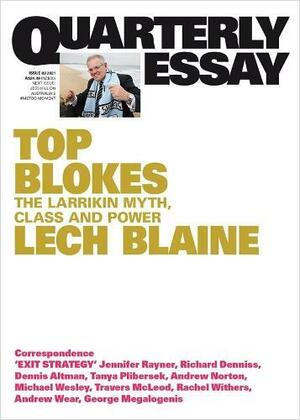
The blurb:
The figure of the larrikin goes deep in Australian culture. But who can be a larrikin, and what are its political uses?
This brilliant essay looks at Australian politics through the prisms of class, egalitarianism and masculinity. Lech Blaine examines some "top blokes," with particular focus on Scott Morrison and Anthony Albanese, but stretching back to Bob Hawke and Kerry Packer. He shows how Morrison brought a cohort of voters over to the Coalition side, "flipping" what was once working-class Labor culture.
Blaine weaves his own experiences through the essay as he explores the persona of the Aussie larrikin. What are its hidden contradictions — can a larrikin be female, or Indigenous, say? — and how has it been transformed by an age of affluence and image?
If you're not familiar with Quarterly Essay, it's a periodical pubished four times a year. Each issue is a single essay of at least 20,000 words, usually focused on some aspect of the Australian political scene (though that can be interpreted pretty broadly).
This one, from 2021, tackles the idea of the 'larrikin' in Australian culture. The idea that Australia is a larrikin, egalitarian society is one of those deeply held foundational myths. Like most of them, it's always been a bit bullshit and is becoming moreso. This essay looks at the idea of the larrikin through current political lenses — not just the right v left type of politics but more broadly. His thesis is that, since the early 70s, Australian politics have undergone a reversal of sorts, where Labor, the party that came from the labour movement, shed its shearer's singlet for a nice suit and tie (Gough Whitlam being the standard bearer for this), and has only play-acted at being blue-collar (think Bob Hawke's main claim to fame of being able to sink a yard glass in world record time) since, while the Liberal Party has increasingly, more successfully (but no more sincerely) cosplayed at being Regular Blokes (John Howard in his trackies, Scott Morrison suddenly becoming the Sharks' number one supporter after a lifetime of being a rah-rah). There have been exceptions to the dishonesty — Malcolm Turnbull never pretended much of an interest in meat pies and beers at the footy, of any stripe, and Bill Shorten's big break into public consciousness came at the Beaconsfield mine collapse — but they're few and far between.
Blaine — named for Lech Wałęsa, in case you had any doubts about where he's coming from, politically speaking — takes examples from his own life, family and friends of family, to look at how politicans act and how they're perceived as acting by voters, and the disparity between the two. Fittingly, for something examing the whole idea of larrikins, the essay is less straight down the line than the usual Quarterly — they're generally more on the scholarly/serious side of things.
Started: 14 April 2025
Finished: 16 April 2025
Back home.
More books.